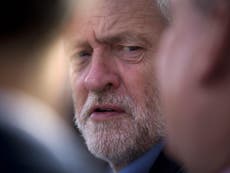Kezia Dugdale risks hammering the final nail into Scottish Labour's coffin by endorsing Owen Smith instead of Jeremy Corbyn
The truth is that the SNP is not a left-wing party – it is predominantly funded by big business and has maintained a position of reducing corporation tax to undercut the rest of the UK. For the SNP to have become Scotland's left-wing party, Labour had to become incredibly toxic
Over the past decade, the Labour Party in Scotland has gone from a position of decline to one of decimation. After winning 69 per cent of Westminster seats in 2005, we lost control at Holyrood 2007 and then, following the independence referendum, fell back to a single seat in 2015. In 2016, Labour came third behind the Conservatives, a party until recently so toxic that it was struggling to maintain its credentials as a credible party in Scotland at all.
The process that drove this collapse is complicated, but it began with Scottish Labour’s disconnect from its founding purpose – and, if Kezia Dugdale’s endorsement of Owen Smith is anything to go by, it is one that the leadership of the party still apparently fails to grasp.
On the working class estates and among the community-minded voters that were once Labour’s backbone, a single phrase keeps being heard: “I didn’t leave Labour - Labour left me.” The SNP have not changed the basic values of Scotland’s Labour base, but they have changed the solutions that people believe in.
The SNP has managed to position itself as the common sense centre-left choice, touting free school meals and well-funded public services as central to their ethos. But the truth is that the SNP is not a left-wing party – it is predominantly funded by big business and has maintained a position of reducing corporation tax to undercut the rest of the UK. Before the 2008 crash, Alex Salmond used to talk about Scotland’s post-independence prospects with reference to the “Celtic tiger” – the deregulated low tax model that is now bringing misery to Ireland. Only in a special kind of political void could Scottish nationalism convincingly portray itself as the new, left-wing populism.
Scottish Labour created that void when it became the party of the Scottish political establishment, committed to austerity politics and tainted by the legacy of the Iraq War. Johann Lamont, leader for 3 years until the independence referendum, staked out her ground by opposing free education and universal benefits. Then the party elected Jim Murphy, a figure whose politics lay even further to the right, as leader. As a result, Scottish Labour’s brand has become toxic. When Kezia Dugdale tried to shift to the left of the SNP on tax and spend in 2016, polls found that voters overwhelmingly agreed with her – but only when the policy was presented without Labour’s name attached to it.
What Scottish Labour desperately needs is an insurgent challenge to the SNP. Running on a policy platform significantly to the nationalists’ left is not just the right thing to do for working class people in Scotland; it is our only way back from the wilderness. There is ample reason to be optimistic about such a strategy. The SNP may have run on an anti-austerity ticket, but across Scotland public services are being starved of funds, and further education is being hit hard. The Scottish government’s council tax freeze, which is still in force, is accelerating the cuts.
But this anti-establishment platform has to be credible – it has to be led by politicians who, unlike the SNP, have been consistent advocates of social justice and radical economic alternatives. For the first time in decades, Jeremy Corbyn is providing a glimpse of that leadership.
Corbyn’s policies – public ownership of services, massive investment in infrastructure and improved trade union rights – are popular across the UK, but they are even more popular in Scotland. And most importantly, his socialism is authentic. During last year’s leadership election, a third of SNP voters said that his leadership makes them more likely to vote Labour again.
The fact that Kezia Dugdale has backed Owen Smith has surprised no one on the left in Scotland. Like Smith, Dugdale is a politician who has seen which way the wind is blowing and shifted to the left. Like Dugdale, Smith’s roots are in the New Labour machine, not the Labour left; in 2006, while he declared his support for PFI as a candidate in the Blanau-Gwent by-election, she was working for a string of centrist Labour MSPs.
Endorsing Smith, Dugdale talked about his credentials as Labour’s unity candidate. But being able to unite 172 Labour MPs is not the same as uniting the Labour Party. When Smith talks about unity and electability, his arguments make sense only inside a bubble dominated by a Labour establishment that has taken its voters for granted and whose grasp on reality has been slipping away for years.
In Scotland, we have learned the hard way that this vision is not a sustainable one for Labour. What we need, here and across the United Kingdom, is an alternative that is radical and credible in reality and not just in name. Jeremy Corbyn is overwhelmingly our best hope for achieving that.



Join our commenting forum
Join thought-provoking conversations, follow other Independent readers and see their replies